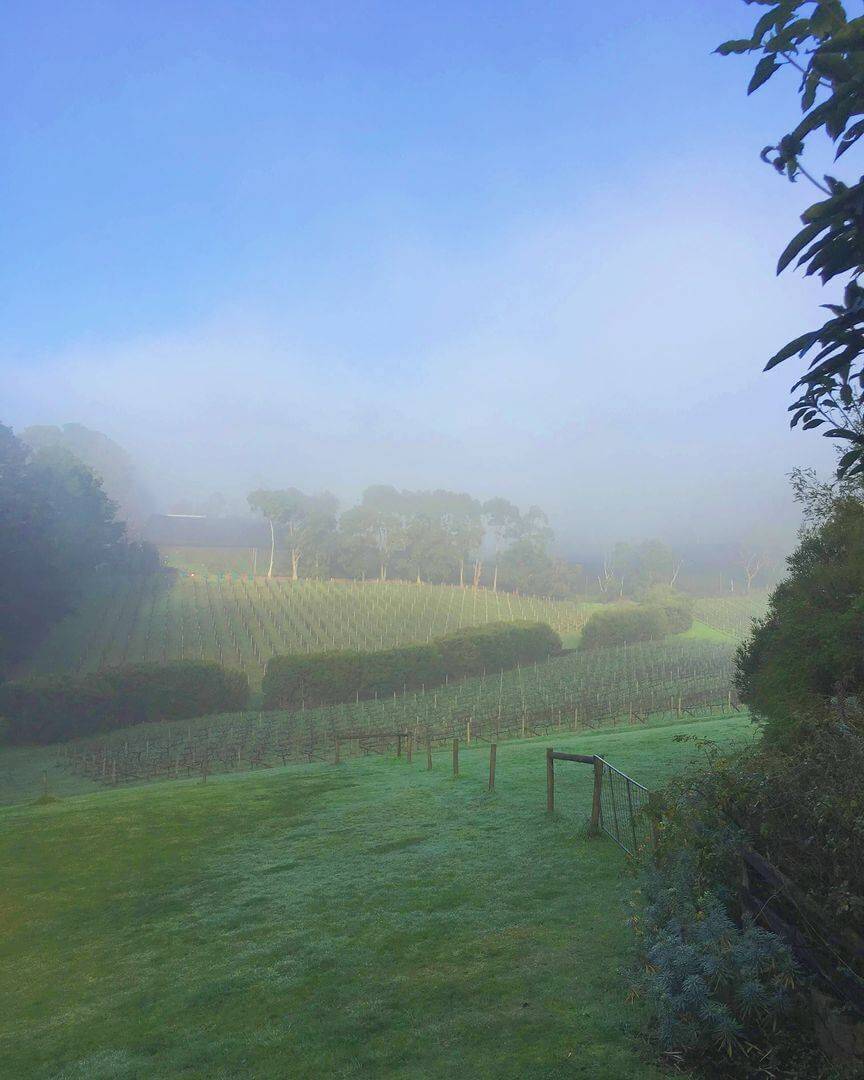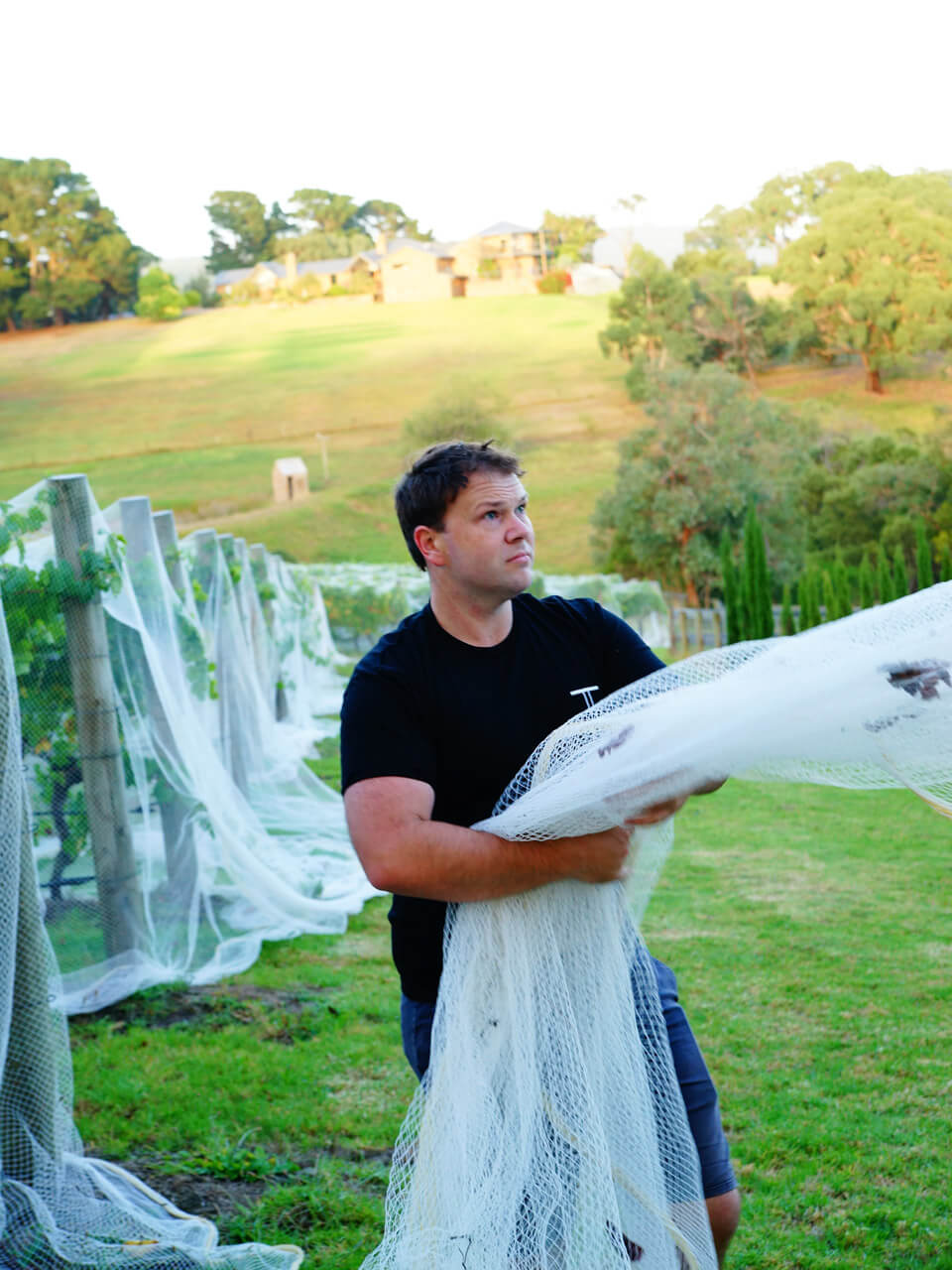Foxeys Hangout was founded by brothers Tony and Michael Lee in the Mornington Peninsula subregion of Red Hill. They work from their organic and biodynamic vineyard and winery to produce mainly chardonnay and pinot noir, along with pinot gris and shiraz. Chris Strickland has risen over the last decade and a half from a casual worker in the cellar door to now oversee both the viticulture and winemaking. His approach is a vineyard first one, leaning on a family history of horticulture and a whole raft of experimentation to make wines from the ground up, with principles of sustainability underpinning all aspects.
“I grew up on the Mornington Peninsula, and most of my family still resides here,” says Strickland. “So, I have a very strong connection to the land and am very at home in Red Hill. The combination of pinot noir, chardonnay and pinot gris with the cool climate and rich soils of the Mornington Peninsula is a match made in heaven. Throw in the amazing concentration that organic farming brings to the fruit and it’s easy to see why we are the premier Australian region for these varieties.”
Foxeys Hangout has one of the Mornington Peninsula’s most loved cellar doors, with a compact but bustling restaurant. It was as a “cellar door allrounder” that Strickland got his start at Foxeys in 2008, while studying a degree in science and education at Monash University. After a switch to vineyard and winery work in the 2009 vintage, he traded disciplines to study at Charles Sturt University.
“After my first vintage, I instantly knew that this is what I wanted to be doing. So, I switched out of the degree I was halfway through and jumped into studying viticulture and winemaking. My family has a farming history: my grandparents ran a market garden, and my dad has a green thumb with a thriving vegetable garden at home and lots of chickens. Viticulture came naturally to me, more so than winemaking. But the more I looked at how things were being done, I was convinced it could be done better.”
That degree was completed in 2014, becoming the assistant winemaker to Tony Lee in 2015, then taking on the head winemaking role in 2020. Strickland also did a vintage at Bodega Ateca in Calatayud, Spain, in 2013 with Michael Kyberd, as well as doing the 2014 vintage with Kyberd back home on the Peninsula. Along with Kyberd and Tony Lee, he also counts Peter Bauer (Dromana Estate) and Barney Flanders (Garagiste) as winemaking mentors.
“The Mornington Peninsula has a thriving community of winemakers, viticulturists and wine-focused hospo peeps that is extremely supportive,” says Strickland. “Having such a vibrant group to bounce ideas off, show wines to, get feedback from and generally improve yourself is immensely valuable. This culture irrevocably changed how I approach making wine… shaping and guiding my winemaking process.”
Strickland also oversaw the process of managing the home vineyard and winery to achieve organic and biodynamic certification, starting in 2017 to being fully certified in 2019. That vineyard was planted by the Lee family and has been organically farmed since 2007.
He also manages the other Foxeys sites, including Morning Sun, which was planted in 1990 by retired concreter Mario Toniolo, and has been leased by the Lees since 2019. “The Morning Sun Vineyard had been well farmed for a long time before I began managing it,” he says. “The main focus of the work I’m doing is to improve soil health and reduce dependence on chemical inputs as much as possible.”
That vineyard focus is essential for Foxeys and Strickland, with very much a vigneron’s approach to making wine. “My main focus is on our vineyards, bringing more over to organic farming, refining our methods of farming to become more efficient and growing better grapes, making better wine,” he says.
“Most winemaking decisions originate in the vineyard, from pruning, light exposure and cropping levels having a massive impact on the final wines. I have been exploring a range of techniques to improve soil health and vine vigour, along with experimenting with different pruning techniques to lift fruitfulness, reduce disease pressure by improving airflow and give more concentration in the final wines.”
Strickland says that there has been a notable increase in fruit concentration from their sites, with the Scotsworth Farm vineyard showing the clearest improvement so far. “It had been seeing declining harvests over the last decade, but we have managed to turn that around by improving the soil health and using pruning and trellising techniques to increase airflow and sunlight interception. The wine has deeper colour, more aromatic intensity and more robust tannin profile, without any winery wizardry required.”
The approach at Foxeys has sustainability at its core, with the shift to organics and biodynamics as much about wine quality as it was about making environmental commitments, says Strickland. “I love being sustainable in all aspects of grape-growing and wine production, from vineyard and winemaking through to bottling and packaging. Investing in solar power, efficient hot water systems, reusing packaging, minimising tractor use, reducing dependency on chemical inputs and so many other things all help to leave the soil in better condition that we inherited it and to reduce our carbon footprint.”
That sustainable ethos also feeds back into how Strickland likes to make wine. “I want them to effortlessly represent the places they are grown,” he says. “So being minimal interventionist in the winery was an obvious road for me to take the Foxeys wines, with a few exceptional parcels that get a little more love, most are very gently handled and guided to their eventuality. “
The Peninsula is a tricky environment to be organic, with a high annual rainfall and subsequent disease pressure, but Strickland believes there are always creative viticultural solutions that can be found, especially with the right people around you.
“The biggest lesson I’ve learnt is to surround yourself with people who are passionate about growing grapes and making wine, and who also share my vision for winemaking. It makes everything so much more manageable knowing I’m not out there alone but have an amazing team to work with.”




